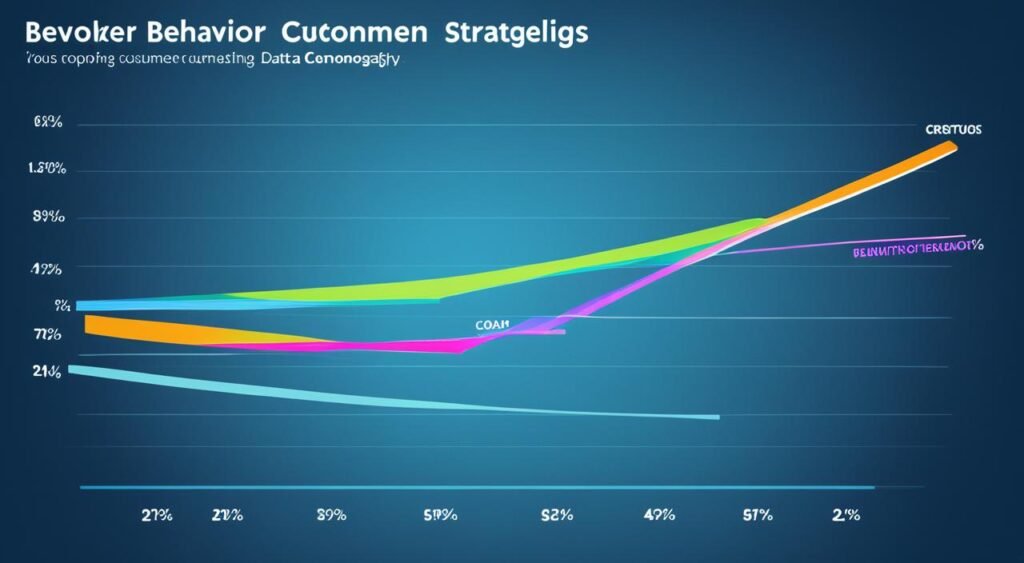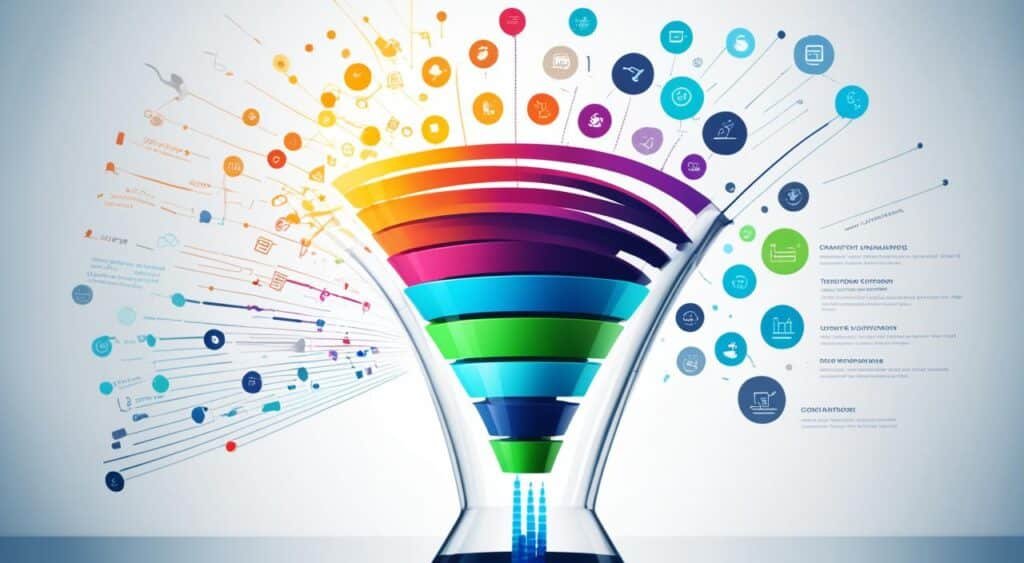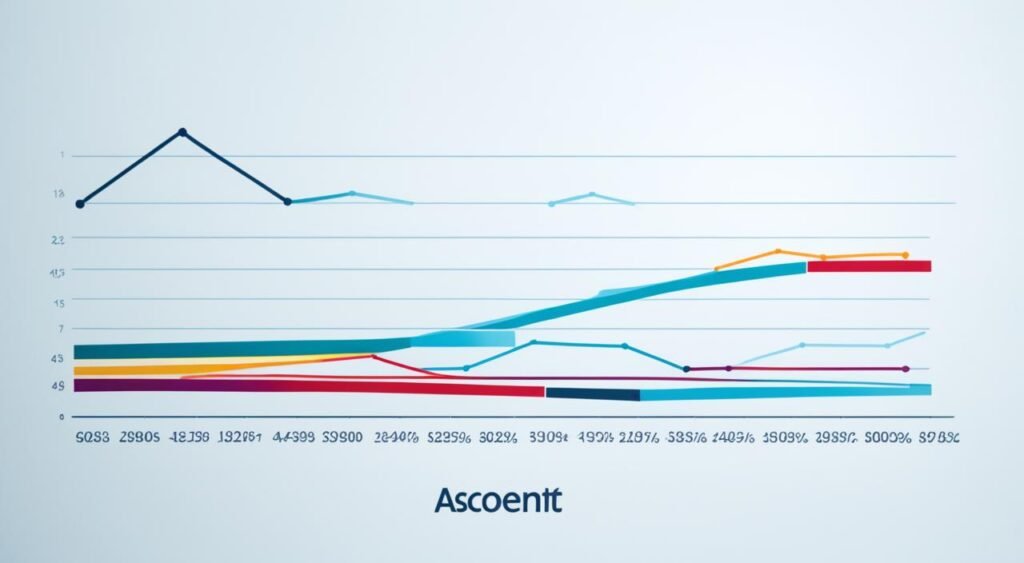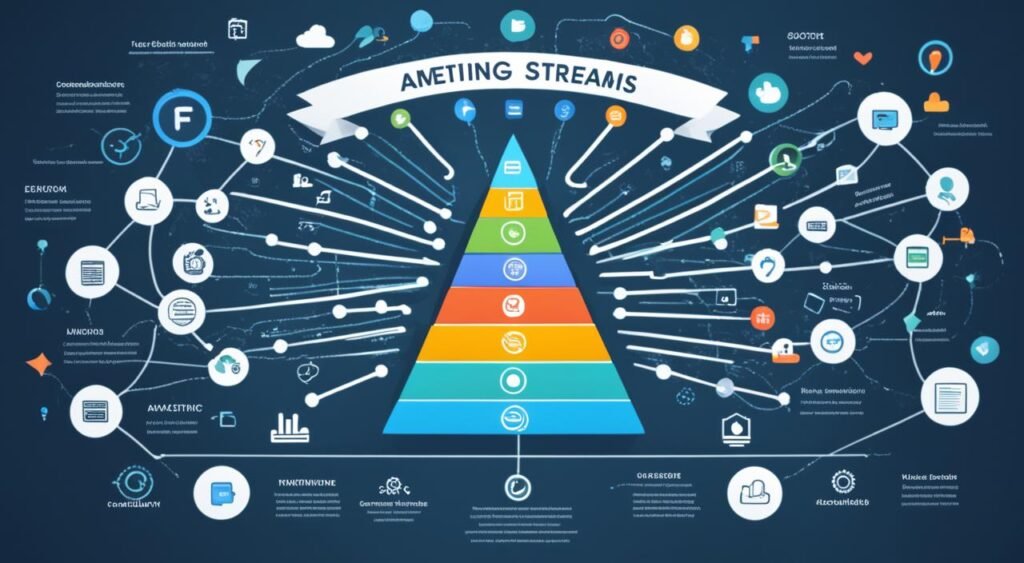Today, strong marketing strategies are key to business success. Thanks to the digital era, marketing has morphed into a dynamic field reliant on data. Advanced tools and methods, including business analytics, have become essential.
Technology’s rapid growth has changed the ways we market products. It offers vast amounts of data to improve our marketing. This article dives into how business analytics is changing our strategies. It will cover the benefits, challenges, and what’s next for this data-driven method.
Key Takeaways
- The digital era has transformed marketing into a data-driven field, requiring the use of business analytics to gain a competitive edge.
- Businesses have access to an unprecedented amount of data that can be leveraged to enhance marketing efforts and drive growth.
- Business analytics provides valuable insights to inform decision-making and optimize marketing strategies.
- Integrating business analytics into marketing strategies offers benefits such as improved targeting, personalized campaigns, better return on investment, and competitive advantage.
- Challenges in implementing business analytics include data quality, integration, and talent acquisition, but can be addressed through the right tools and strategies.
Introduction to Business Analytics in Marketing
Marketing has changed a lot over the years. This change came from technology improvements, new ways consumers behave, and a larger focus on data. The shift from how things were before the internet, to now with social media, has been huge. This change made using business analytics in marketing very important to make more money.
The Evolution of Marketing
The growth of marketing can be seen in three big eras: traditional, digital, and social media. These eras match up with changes in what consumers like and technology. Each era has seen big shifts in how businesses connect with their audience.
Traditional Marketing (Pre-Internet Era)
The time before the internet was all about big media like TV, radio, and newspapers. Marketers then tried to reach as many people as possible with the same message. They mainly guessed or went with what felt right when making decisions.
Digital Marketing (Internet Era)
The internet changed how marketing worked. Now, businesses could use digital tools to find and talk to customers. Digital marketing uses online places like search engines and social media to connect more personally. It also brought in lots of data to understand customers better, which is where business analytics meets marketing.
Social Media Marketing and Personalization
Social media has made a big difference in marketing. Businesses can now talk to customers in a more personal way. By looking at data, they can make marketing that really fits each customer. This mix of social media and personal touch is now key to making marketing work well.
Big Data and Analytics
The amount of data now available, known as big data, is pushing marketing even further. Businesses are swimming in customer info, behaviors, and likes. Using business analytics, companies can pull all this data and find new ways to reach more people effectively. This process helps them make smarter choices and improve their overall marketing game.
What is Business Analytics?

Business analytics means studying data to find important information. It helps in making decisions and growing a business. In marketing, business analytics looks at data about how customers act, how well ads work, and current trends. Using this approach, companies change the way they plan and use marketing.
Data-Driven Marketing
Marketers use business analytics to understand what customers like and how to sell more. This way of working is all about using data to decide what to do and make marketing better. They can create ads and products that people will really connect with.
Artificial Intelligence (AI) and Machine Learning
Artificial intelligence (AI) and machine learning have made business analytics even more powerful. They can look at big amounts of data, find patterns, and predict what might work best. This helps marketers to come up with strategies and campaigns that are more likely to succeed.
Customer-Centric Marketing
Business analytics makes marketing all about the customer. It helps companies understand their customers better by looking at their data. This way, businesses can make ads, content, and deals that people will find interesting. It’s all about improving the whole customer experience.
The Role of Business Analytics in Marketing

Business analytics is key in today’s marketing strategies. It helps businesses by carefully looking at data. This way, they learn important things to make better choices and improve their marketing work. Look at some facts that show how important business analytics is in marketing:
Statistics Speak Volumes
| Statistic | Impact |
|---|---|
| 80% of marketers say data-driven marketing is crucial to their success. | Using business analytics for strong marketing strategies is very important. |
| Organizations that use data-driven marketing are six times more likely to be profitable year-over-year. | Companies that use business analytics and data-driven marketing have a big edge. |
| Marketers who use predictive analytics see a 73% average increase in campaign performance. | Using predictive analytics makes marketing more effective by predicting what customers do. |
| Businesses that use big data and analytics have a 126% increase in profits. | Big data and business analytics can greatly boost a company’s financial performance. |
“The foundation of marketing in the 21st century is data. If you’re not using data to drive your marketing, you’re operating in the dark ages.”
These facts highlight the vital role of business analytics in marketing. They show the great benefits it offers to all kinds of businesses. With a data-driven marketing approach, companies can understand their customers better and improve their marketing. This can lead to lasting growth.
Benefits of Business Analytics in Marketing

Business analytics in marketing helps companies in many ways. It leads to:
Improved Targeting
Marketers understand their audience better with data and analytics. This makes marketing campaigns more personal and efficient. By using data to segment customers, companies spot their top clients. They then adjust their messages to meet these customers’ needs.
Personalized Campaigns
Thanks to business analytics, marketers create campaigns that speak directly to customers. They look at what people buy, their behavior, and other information. With this, companies provide customized content and products. This makes customers happier and more likely to buy again.
Better Return on Investment
Business analytics helps marketers pick the best ways to spread their messages. It also helps spend money wisely. By tracking their marketing’s success, companies can use their funds better. This leads to a higher return on their investments.
Competitive Advantage
Companies using business analytics well can get ahead. Making choices based on data helps them stand out. They offer better, more focused experiences to customers. This can help them grow and thrive over time.
Challenges and Solutions of Business Analytics in Marketing

As companies add business analytics to marketing, they face some tricky issues. They must find smart ways to tackle these. Two big hurdles they often face are:
- Data Quality and Integration – Making sure data is all good from different sources can be tough. Firms should focus on strong data management. This includes cleaning, making data the same, and combining it well.
- Talent and Skill Gap – Using analytics well needs special skills in analyzing data and understanding deep insights. Companies might not have enough experts to turn data into marketing actions.
Here are some ways businesses can beat these challenges:
| Challenge | Solution |
|---|---|
| Data Quality and Integration |
|
| Talent and Skill Gap |
|
When companies face these problems head-on with the right solutions, amazing things can happen. They can get closer to their customers, make campaigns more personal, and see better returns on their investments.
Also Read :Business Finance Essentials for Success
Business Analytics Tools and Technologies

Using the right tools is key for businesses to succeed with analytics in marketing. Some top tools include:
Google Analytics
Google Analytics shines a light on website traffic, user actions, and campaign success. It helps marketers tweak their strategy, improve user experiences, and choose wisely to get better outcomes.
HubSpot
HubSpot stands out with its wide range of marketing, sales, and support tools. Companies can track where leads come from, how their content performs, and how they engage with customers. This data fuels smarter marketing plans rooted in solid data.
Tableau
Tableau focuses on turning data into visual stories for insights. Marketers can build interactive reports and dashboards, gaining clear and actionable insights from their data. Its ease of use and deep analysis features draw many businesses aiming for data-informed choices.
Future Trends of Business Analytics in Marketing

The field of business analytics in marketing keeps changing and improving. New trends are appearing, and they could change how marketing works in the future. Some big upcoming trends are:
Artificial Intelligence (AI) and Machine Learning
AI and machine learning are getting better all the time. They will soon be a big part of marketing. With these technologies, companies can do things like automatically analyze data. They can also give customers personalized service and use data to make better decisions about their marketing.
Predictive Analytics
This type of analytics will be key for the future of marketing. It allows companies to use old data and new machine learning tools to learn about their customers and the market. With this, they can predict future trends and adjust their marketing ahead of time.
Voice and Conversational Analytics
Voice-controlled devices and chats are becoming more popular. Companies are starting to use these to learn more about their customers. This information helps them offer marketing that feels personal and easy for their customers.
Augmented Reality (AR) Analytics
Augmented reality will soon change how marketing data is collected and used. Companies can track how customers interact with their products in AR. This information helps them improve their marketing and make it more fun for their customers.
Business Analytics and Marketing Strategies

Business analytics is changing how companies look at their marketing. It uses data to deeply understand customers. This lets companies personalize their marketing on a big scale and make their campaigns hit harder.
Enhanced Customer Understanding
By analyzing lots of customer data, businesses really get their audience. Knowing their customers well, they create marketing that really speaks to them. This helps companies better meet what their customers want.
Personalization at Scale
Thanks to business analytics, companies can personalize marketing in big ways. They use advanced data tools to tailor content and offers to every customer. This builds stronger connections with customers and keeps them coming back.
Optimized Marketing Campaigns
Using business analytics makes marketing better and more profitable. Companies can tweak and improve their ads and strategies with real data. This way, they make smarter choices and get the most out of their marketing budgets.
Impact of Business Analytics on Customer Retention

Customer retention is key to success in today’s business world. Thanks to business analytics in marketing, companies are seeing real results. This is good news for all types of organizations.
Reduced Churn Rate
Data analytics helps businesses better understand their customers. They identify what makes customers leave and work on solutions. They use models and break down customers into groups. This way, they meet at-risk customers’ needs before they leave, improving their loyalty over time.
Companies that bring data analytics into their strategy can keep customers longer. They look at what customers do and what they like. Then, they offer things that match, making customers stay around more.
Increased Customer Lifetime Value
Using analytics, companies can make choices that keep customers for the long run. They look at buying habits and interactions. This lets them offer custom solutions and enhance the customer experience. It makes customers more loyal and worth more over time.
This way of using data lets companies spend smarter on marketing. They make every effort count by focusing on what really keeps customers happy.
Enhanced Customer Experience
Keeping customers happy and coming back is about more than just analytics. It’s about knowing what customers really like and need. This is where analytics shines. It tells companies how to adjust what they offer and say to customers. This creates strong bonds and makes customers more likely to stay around.
| Key Impact | Benefit |
|---|---|
| Reduced Churn Rate | Proactive identification and retention of at-risk customers, leading to higher customer lifetime value. |
| Increased Customer Lifetime Value | Personalized offerings and enhanced customer experience that foster long-term customer loyalty. |
| Enhanced Customer Experience | Deeper understanding of customer preferences and pain points, enabling the delivery of tailored solutions that meet their needs. |
Data-Driven Content Creation

In our digital world, content takes the crown. This means businesses must use data to create smarter content. Data-driven content creation uses analytics to shape digital content. By doing so, content makers can improve their work’s impact.
Audience Understanding
Understanding your audience deeply is key to successful data-driven content creation. By looking at customer data and trends, companies can figure out what their audience likes. Knowing this helps content creators make content that really speaks to their audience.
Keyword Research
Doing good keyword research is vital. It helps content creators find out what their audience is searching for online. Putting these keywords in the content can boost its visibility and make it more useful for readers.
Content Optimization
Keeping content up-to-date is crucial. By watching how their content performs, companies can see what’s working and what’s not. They can then tweak their content to make it better match their audience’s needs.
Topic Selection
Choosing the right topics to cover is essential. Using data-driven insights, companies can pick topics that their audience will really be interested in. This ensures content is relevant and engaging, which can help a business grow.
Conclusion
In today’s business world, marketing must keep getting better to work well. Business analytics helps in this, using data to make smart marketing plans. This lets companies know what their customers like, and offer them just that.
Using business analytics in marketing changes how companies do things. It makes it easier for companies to aim their marketing well, make it personal, get better at spending their money, and be ahead of others. As the amount of data gets bigger, companies will need to use smart data choices in marketing. This makes business analytics key for winning in marketing.
The future of business analytics in marketing looks exciting. Things like Artificial Intelligence and Augmented Reality will make marketing even smarter. Companies that keep up with these new ideas will do well in the changing marketing world.
FAQs
Q: What is business analytics?
A: Business analytics is the practice of using data analysis tools and techniques to analyze business data and make informed decisions.
Q: How does business analytics differ from data analytics?
A: Business analytics focuses on using data analysis to inform business decisions and strategies, while data analytics is a broader term that refers to analyzing any type of data.
Q: What are the different types of business analytics?
A: The main types of business analytics include descriptive analytics, diagnostic analytics, predictive analytics, and prescriptive analytics.
Q: What role does a business analyst play in business analytics?
A: A business analyst is responsible for collecting and analyzing business data to inform decision-making processes and solve business problems.
Q: How is business intelligence related to business analytics?
A: Business intelligence is a subset of business analytics that focuses on gathering, analyzing, and visualizing business data to inform strategic decision-making.
Q: What skills are required to excel in the field of business analytics?
A: Skills needed for business analytics include data analysis, data visualization, business acumen, problem-solving, and critical thinking.
Q: How is business analytics revolutionizing marketing strategies?
A: Business analytics provides marketers with insights into consumer behavior, market trends, and campaign performance, enabling them to optimize marketing strategies for better results.
Source Links
- https://www.hulhub.com/business-analytics-in-marketing
- https://www.linkedin.com/pulse/revolutionizing-marketing-strategies-power-data-science-murgad-6gubc
- https://medium.com/@iabac/how-business-analytics-is-revolutionizing-marketing-146a6b89f6ef




